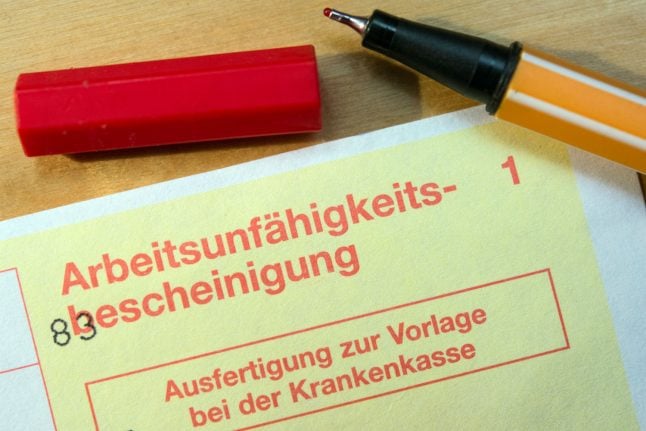For the next four weeks, patients with mild respiratory tract infections, such as a common cold, will no longer have to visit the doctor for a sick note (known as an AU-Bescheinigung or Arbeitsunfähigkeitsbescheinigung in German).
They can call their doctor and be granted up to seven days of sick leave after a telephone consultation.
Usually employees in Germany who become ill are required to visit the doctor in person and then submit a sick notification on paper directly to their employer.
READ ALSO: Follow the latest on the coronavirus situation in Germany here
Under current German law (Entgeltfortzahlungsgesetz, or the Continued Renumeration Act), an employee can stay home sick for up to three days without having to contact a doctor or presenting a note to their employer.
Health insurance organisations and doctors came to the agreement in a bid to ease the pressure on health workers in view of the spread of coronavirus in Germany.
“We are in an extraordinary situation – and this also requires extraordinary measures”, said the National Association of Statutory Health Insurance Physicians (KBV) and the Central Association of Statutory Health Insurance Companies (GKV-Spitzenverband) in a report in German daily Welt on Tuesday.
In response to an enquiry by Welt, the KBV said that in view of the current packed-out waiting rooms due to the coronavirus outbreak and the flu season, they were “interested in relieving the burden on the practices where possible”.
The new measures, which kicked on Monday March 10th, are initially only in place for four weeks.
However, it would still be up to the doctor to decide whether he or she wanted to see the patient personally – “for example, because the symptoms described indicate a more serious illness”.
There is a different protocol in place for those suspected of having coronavirus (COVID-19).
If someone is suspected of having the virus, sick leave can also be granted, and patients would likely be asked to self-isolate or given medical treatment.
According to the Robert Koch Institute, people who show respiratory symptoms or other general symptoms such as a high temperature or cough after being in touch with a confirmed coronavirus patient are suspected of having COVID-19.
READ ALSO: Coronavirus: How, where and when to get tested or self-quarantine in Germany
People with these symptoms who have recently returned from a high-risk area or have been in contact with someone who's been in a high-risk area are also suspected cases.
Anyone with concerns or if they suspect they have the virus is urged to call the national hotline on 116 117 or their doctor to be advised on the next steps. Some states have also set up their own coronavirus advice lines.
READ ALSO: The 10 rules you need to know if you get sick in Germany



 Please whitelist us to continue reading.
Please whitelist us to continue reading.
Member comments